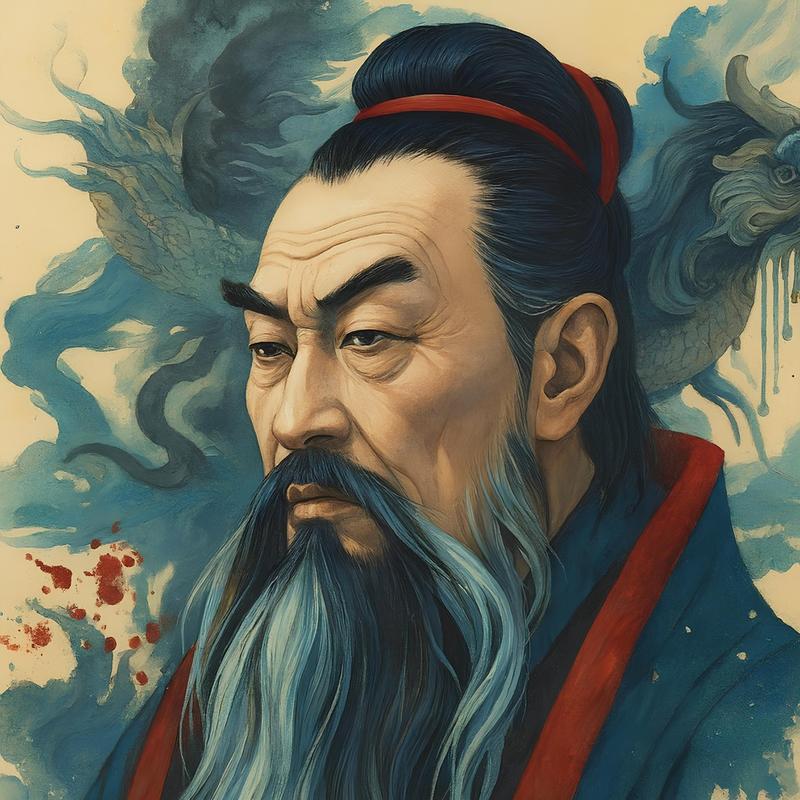
时长:
86分钟
播放:
128
发布:
4个月前
主播...
简介...
道德的本质和来源是什么?人类天生就倾向于道德向善吗?孟子认为,人性本有某些道德的「端」(萌芽),这些端点可以经过培养和发展,成长为健全的美德。在本期播客中,我们将探讨孟子关于道德端点的理论,并从哲学和心理学的角度分析这些端存在的依据。
孟子「四端」 Moral Sprouts
* The feeling of compassion [恻隐之心]
* The feeling of disdain [羞恶之心]
* The feeling of deference [辞让之心]
* The feeling of approval and disapproval [是非之心]
时间轴
0:00 Part I 聊了聊搬家
8:47 主题引入
18:10 Part II 孟子提出的「四端」
18:15 引入「孟子见孺子将入于井」段落
19:07 讨论段落 (1)(2)
22:57 「义」这一美德是什么? What is this virtue “righteousness”?
34:04 讨论段落 (3)
36:06 「端」是萌芽状态的,需要被培养和发展 The sprouts are incipient. They need to be developed.
38:35 孟子认为,我们内心的道德倾向(或意愿、本能)比我们所意识到的要多 Mencius is demonstrating that we have more moral desires than we realize
42:04 「为什么这些道德倾向比其他欲望更为重要?(也就是『我们真正想要的是什么?』)」What makes these moral desires more important than others (“what we really want”)?
45:52 人的善就是实现自己的内心愿望吗?Is Mencius suggesting that our good consists in fulfilling our desires?
50:23 做人的意义是什么? What is the significance of being human?
59:52 道德愿望具有「乍然」发生的特点,有何意义?The significance of the fact that themoral desires are "sudden"
1:05:26 情感、认知与智慧 Feelings, cognition, and wisdom
1:16:18 「端」作为道德心理的基本要素 The sprouts as moral modules
1:24:10 下集我们继续聊孟子:如何培养和提升这些「端」?Preview of the next episode: how do you improve upon the sprouts?
重点讨论段落 --《孟子·公孙丑上》恻隐之心
孟子曰:「人皆有不忍人之心。先王有不忍人之心,斯有不忍人之政矣。以不忍人之心,行不忍人之政,治天下可运之掌上。」
「所以谓人皆有不忍人之心者,今人乍见孺子将入于井,皆有怵惕恻隐之心。非所以内交于孺子之父母也,非所以要誉于乡党朋友也,非恶其声而然也。由是观之,无恻隐之心,非人也;无羞恶之心,非人也;无辞让之心,非人也;无是非之心,非人也。」
「恻隐之心,仁之端也;羞恶之心,义之端也;辞让之心,礼之端也;是非之心,智之端也。人之有是四端也,犹其有四体也。有是四端而自谓不能者,自贼者也;谓其君不能者,贼其君者也。凡有四端于我者,知皆扩而充之矣,若火之始然,泉之始达。苟能充之,足以保四海;苟不充之,不足以事父母。」
(English version: Mengzi 2A6, slightly modified from Bryan Van Norden’s translation)
目前节目持续更新中,每周一与你见面,欢迎订阅收听!如果你有任何想法或建议,欢迎在评论区留言,或前往 Warp, Weft, and Way 网站参与讨论。
其他参考资料
Hallgeir Sjåstad and Roy F. Baumeister, “The Future and the Will: Planning requires self-control, and ego depletion leads toplanning aversion” (influential article on “decision fatigue”)
子思 (perhaps Mencius’s teacher)
Inglorious Basterds (《无耻混蛋》,昆汀·塔伦蒂诺,2009)
Philippa Foot (一位我们最近经常提及的哲学家)
Eirik Lang Harris, “The Nature of the Virtues in Light of the Early Confucian Tradition” (response to Foot on behalf of Confucian virtue theory)
Philip J. Ivanhoe, “Confucian Self Cultivation and Mengzi’s Notion of Extension” (chapter 8 of this book)
Franklin Perkins, Doing What You Really Want
Yong HUANG, Why Be Moral?
Mencius 6A6 on 「性善」
Daniel Kahneman, Thinking Fast and Slow (source of the phrases “system 1” and “system 2” to refer to different kinds of thinking)
Richard Kim, Confucianism and the Philosophy of Well-Being
Martha Nussbaum, Upheavals of Thought
Owen Flanagan, The Geography of Morals (see chapters 3-5 on the moral sprouts and moral modules)
Jonathan Haidt, Moral FoundationsTheory
特别鸣谢 The Hong Kong Ethics Lab 的支持和赞助,以及 Warp, Weft and Way 网站对讨论环节的支持。
主持人:Richard Kim's website
Justin Tiwald's website
音频剪辑 & 中文 show notes: Lena
孟子「四端」 Moral Sprouts
* The feeling of compassion [恻隐之心]
* The feeling of disdain [羞恶之心]
* The feeling of deference [辞让之心]
* The feeling of approval and disapproval [是非之心]
时间轴
0:00 Part I 聊了聊搬家
8:47 主题引入
18:10 Part II 孟子提出的「四端」
18:15 引入「孟子见孺子将入于井」段落
19:07 讨论段落 (1)(2)
22:57 「义」这一美德是什么? What is this virtue “righteousness”?
34:04 讨论段落 (3)
36:06 「端」是萌芽状态的,需要被培养和发展 The sprouts are incipient. They need to be developed.
38:35 孟子认为,我们内心的道德倾向(或意愿、本能)比我们所意识到的要多 Mencius is demonstrating that we have more moral desires than we realize
42:04 「为什么这些道德倾向比其他欲望更为重要?(也就是『我们真正想要的是什么?』)」What makes these moral desires more important than others (“what we really want”)?
45:52 人的善就是实现自己的内心愿望吗?Is Mencius suggesting that our good consists in fulfilling our desires?
50:23 做人的意义是什么? What is the significance of being human?
59:52 道德愿望具有「乍然」发生的特点,有何意义?The significance of the fact that themoral desires are "sudden"
1:05:26 情感、认知与智慧 Feelings, cognition, and wisdom
1:16:18 「端」作为道德心理的基本要素 The sprouts as moral modules
1:24:10 下集我们继续聊孟子:如何培养和提升这些「端」?Preview of the next episode: how do you improve upon the sprouts?
重点讨论段落 --《孟子·公孙丑上》恻隐之心
孟子曰:「人皆有不忍人之心。先王有不忍人之心,斯有不忍人之政矣。以不忍人之心,行不忍人之政,治天下可运之掌上。」
「所以谓人皆有不忍人之心者,今人乍见孺子将入于井,皆有怵惕恻隐之心。非所以内交于孺子之父母也,非所以要誉于乡党朋友也,非恶其声而然也。由是观之,无恻隐之心,非人也;无羞恶之心,非人也;无辞让之心,非人也;无是非之心,非人也。」
「恻隐之心,仁之端也;羞恶之心,义之端也;辞让之心,礼之端也;是非之心,智之端也。人之有是四端也,犹其有四体也。有是四端而自谓不能者,自贼者也;谓其君不能者,贼其君者也。凡有四端于我者,知皆扩而充之矣,若火之始然,泉之始达。苟能充之,足以保四海;苟不充之,不足以事父母。」
(English version: Mengzi 2A6, slightly modified from Bryan Van Norden’s translation)
目前节目持续更新中,每周一与你见面,欢迎订阅收听!如果你有任何想法或建议,欢迎在评论区留言,或前往 Warp, Weft, and Way 网站参与讨论。
其他参考资料
Hallgeir Sjåstad and Roy F. Baumeister, “The Future and the Will: Planning requires self-control, and ego depletion leads toplanning aversion” (influential article on “decision fatigue”)
子思 (perhaps Mencius’s teacher)
Inglorious Basterds (《无耻混蛋》,昆汀·塔伦蒂诺,2009)
Philippa Foot (一位我们最近经常提及的哲学家)
Eirik Lang Harris, “The Nature of the Virtues in Light of the Early Confucian Tradition” (response to Foot on behalf of Confucian virtue theory)
Philip J. Ivanhoe, “Confucian Self Cultivation and Mengzi’s Notion of Extension” (chapter 8 of this book)
Franklin Perkins, Doing What You Really Want
Yong HUANG, Why Be Moral?
Mencius 6A6 on 「性善」
Daniel Kahneman, Thinking Fast and Slow (source of the phrases “system 1” and “system 2” to refer to different kinds of thinking)
Richard Kim, Confucianism and the Philosophy of Well-Being
Martha Nussbaum, Upheavals of Thought
Owen Flanagan, The Geography of Morals (see chapters 3-5 on the moral sprouts and moral modules)
Jonathan Haidt, Moral FoundationsTheory
特别鸣谢 The Hong Kong Ethics Lab 的支持和赞助,以及 Warp, Weft and Way 网站对讨论环节的支持。
主持人:Richard Kim's website
Justin Tiwald's website
音频剪辑 & 中文 show notes: Lena
评价...
空空如也
小宇宙热门评论...

HD955287v
4个月前
中国香港
0
1:17:59 Ricard & Aristotle 本集打卡 🤣

